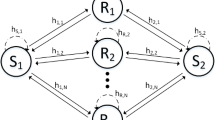Abstract
Cooperative diversity is proposed as a means to improve the wireless transmission performance, which can effectively combat the wireless fading through sharing the antennas between source and relay nodes. In this paper, considering the practicability, we investigate the use of half-duplex relay, rather than full-duplex relay, for the opportunistic cooperation diversity. Two combining methods, namely selection diversity combining (SDC) and maximum ratio combining (MRC), are utilized for the implementation of the half-duplex relay-based opportunistic cooperation. Closed-form expressions of outage probability are derived for the proposed opportunistic cooperation as well as the known deterministic cooperation over Rayleigh fading channels. Numerical results show that the opportunistic cooperation is superior to the traditional deterministic cooperation in terms of outage probability and, moreover, the MRC-based case outperforms the SDC-based case no matter which duplex mode relay (i.e., half-duplex and full-duplex) is used for the opportunistic cooperation.
Similar content being viewed by others
References
Goldsmith A, Jafar S A, Jindal N, et al. Capacity limits of MIMO channels. IEEE J Select Area Commun, 2003, 21: 684–702
Zheng J, Rao B D. LDPC-coded MIMO systems with unknown block fading channels: soft MIMO detector design, channel estimation, and code optimization. IEEE Trans Signal Process, 2006, 54: 1504–1518
Sendonaris A, Erkip E, Aazhang B. User cooperation diversity part I: System description. IEEE Trans Commun, 2003, 51: 1927–1938
Laneman J N, Tse D N C, Wornell G W. Cooperative diversity in wireless networks: Efficient protocols and outage behavior. IEEE Trans Inf Theory, 2004, 50: 3062–3080
Hunter T E, Sanayei S, Nosratinia A. Outage analysis of coded cooperation. IEEE Trans Inf Theory, 2006, 52: 375–391
Zou Y L, Zheng B, Zhu X. A new cooperative diversity scheme for next generation wireless network. In: The Fifth IEEE Consumer Communications and Networking Conference, Las Vegas, USA, 2008. 938–942
Zou Y L, Zheng B Y, Zhu J. Outage analysis of opportunistic cooperation over Rayleigh fading channels. IEEE Trans Wirel Commun, 2009, 8: 3077–3085
Zou Y L, Zheng B Y, Zhu W P. An opportunistic cooperation scheme and its BER analysis. IEEE Trans Wirel Commun, 2009, 8: 4492–4497
Gunduz D, Erkip E. Opportunistic cooperation by dynamic resource allocation. IEEE Trans Wirel Commun, 2007, 6: 1446–1454
Viswanath P, Tse D N C, Laroia R. Opportunistic beam-forming using dumb antennas. IEEE Trans Inf Theory, 2002, 48: 1277–1294
Scaglione A, Hong Y W. Opportunistic large arrays: Cooperative transmission in wireless multihop ad hoc networks to reach far distances. IEEE Trans Signal Process, 2003, 51: 2082–2092
Author information
Authors and Affiliations
Corresponding author
Rights and permissions
About this article
Cite this article
Zou, Y., Zheng, B. & Zhu, J. Performance evaluation of half-duplex relay-based opportunistic cooperation diversity. Sci. China Inf. Sci. 53, 325–334 (2010). https://doi.org/10.1007/s11432-010-0028-6
Received:
Accepted:
Published:
Issue Date:
DOI: https://doi.org/10.1007/s11432-010-0028-6




